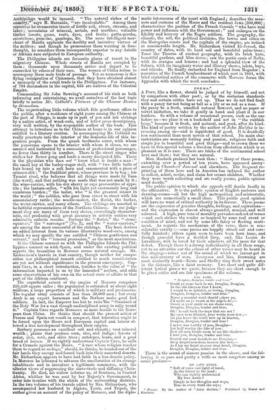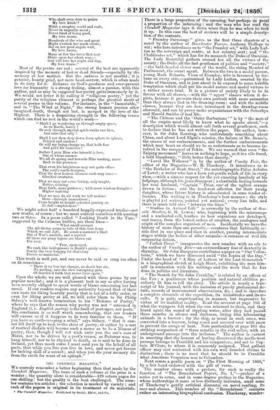POEMS.*
A POET, like a flower, should be judged of by. himself, and not by comparison with other poet-3, or by the sectarian standards they and certain critics have set up. Thus we do not find fault with a pansy for not being as tall as a lily or as red as a rose. If the pansy be a fresh, unsoiled natural floweret, and no paper or velvet imitation, we take it gently in hand and plant it in our borders. So with a volume of occasional poems, such as the one before us—we place it on 'a bookshelf and not in "the rubbish heap," because it is fresh, and natural, and good, after its kind. The kind of poetry written by the author of John Halifax is in- creasing among us—and is significant of good. It is decidedly less sentimental than most novels of that school. Its main cha- racteristics are womanly feeling and passion, religious faith and simple joy in beautiful and good things—and to crown these we have in this special volume a freedom from affectation which is as
i pleasant as it is rare. There are tricks of the sentimental school here and there ; but they are natural.
Miss Murloch prefaces her book thus : " Many of these poems, extending over a period of ten years, have appeared anony- mously in Chambers' Journal and elsewhere. The frequent re- printing of them here and in America has induced the author to collect, select, revise, and claim her errant children. Whether they were worth collecting and are really poems, public opinion must decide."
The public opinion to which she appeals will decide loudly in the affirmative. It is the public opinion of English parlours and drawing-rooms—all but the high metropolitan and aristocratic, which are numerically a small class. This public good opinion will have no want of critical authority in its favour. These poems
are the expression of is thoughts, feelings, and aspirations— and the expression s almost always graceful, musical, and well coloured. A high, pure tone of morality pervades each set of verses —and each strikes the reader as inspired by some real event or caudition of mind, and not by some idle fancy or fleeting senti- ment. As regards the mechanism of the verse, there is con- siderable variety ;—some poems are happily struck out and care- fully finished ; others again seem to have been born lame, and though graceful have a decided limp, and, like Louise de Lavalliere, will be loved by their admirers all the more for that defect. Though there is a strong individuality in all these songs, i yet to an attentive ear the echoes of other voices may be heard in the singing—voices out of the sound of which we cannot get in this mid-century of ours. Tennyson and Mrs. Browning are most distinctly heard—Keats and Shelley ring their sweet notes in the distance, like a faint memory. Two short and quite
ferent lyrical pieces we pate, because they are short enough to be given entire and are fair specimens of the volume.
TOG LATE.
" Douglas, Douglas, tend ir cad trew."
" Could ye come back to me, Douglas, Douglas, In the old likeness that I knew, I would be so faithful, so loving, Douglas, Douglas, Douglas, tender and true."
Never a scornful word should grieve ye, I'd smile on ye sweet as the angels do ;— Sweet as your smile on me shone ever, Douglas, Douglas, tender and true.
Oh ! to call back the days that are not I
My eyes were blinded, your words were few ;- Do you know the truth now up in heaven, Douglas, Douglas, tender and true ?
I never was worthy of you, Douglas—
Not half worthy the like of you :
Now all men beside seem to me like shadows—
I love you, Douglas, tender and true.
Stretch out your hands to me Douglas,— Drop forgiveness from heaven like dew,— As I lay my heart on your dead heart, Douglas,
Douglas, Douglas, tender and true.
There is the sound of sincere passion in the above, and the fol- lowing is as pure and pretty a trifle as most songsters among us could produce—
MY LOVE A.MNIE.
`! Soft of voice and light of hand, As the fairest in the land ; Who can rightly understand My love Annie ?
Simple in her thoughts and ways, True in every word she says;
• Poems. By the Author of "lobo lialifax." Published by Hurst and Blackett.
Who shall even'dare to praise My love Annie ?
Midst a naughty world and rude, Never in ungentle mood Never tired of being good, My love Annie.
Hundreds of the wise and great Might o'erlook her meek estate; But on her good angels wait, My love Annie.
Many or few the loves that may Shine upon her silent way,— God will love her night and day, My love Annie."
Most of the poems are sad ; several of the best are apparently inspired by the memory of lost or dead friends—especially by the memory of her mother. But the sadness is not morbid ; it is genuine, hearty grief, not mere head-sorrow, which is often made to do duty for it. Reliance on God's goodness and ever-present love for humanity is a strong feeling, almost a passion, with this author, and as may be supposed her poetry gains immensely by it. We would not lower it by calling it "religious poetry," yet the purity of the religious element is perhaps the greatest merit of several poems in this volume. For instance, in the " Immutable," and in "The Wind at Night," the strong human passion after imagined death, though not lost, is merged in the love of the Highest. There is a despairing strength in the following verses which can find no rest in the world's work-
" Shall I go wandering on through empty space, As on Earth, lonely ?
Or seek through myriad spirit-ranks one face, And miss that only ?
Shall I not then drop down from sphere to sphere, Palsied and aimless ?
Or will my being change so, that both fear And grief die nameless ?
Rather I pray Him who himself is love, Out of whose essence We all do spring and towards Him tending, move Back to his presence.
That even his brightness may not quite efface The soul's earth-features, That the dear human likeness each may trace— Glorified creatures.
That we may not cease loving, only taught, Holier, desiring More faith, more patience ; with more wisdom fraught— Higher aspiring.
That we may do all work we left undone Here--through unraeetness ; From height to height celestial passing on To full completeness."
We might select half a hundred happily-expressed truths—not new truths, of course ; but we must content ourselves with quoting
two or three. In a poem called " Looking Death in the Face,"
suggested by the Crimean battles, are these lines-
" What small account
The All-living seems to take of this thin flame
Which we call Life. He sends a moment's blast
Out of War's nostrils, and a myriad Of these our puny tapers are blown out For ever. " Free, open-eyed,
We rush like bridegrooms to Death's grisly arms ;
Surely the very longing for that clasp Proves us immortal."
This truth is well put, and can never be said or sung too often on fit ocoasions-
" There is no loss but change, no death but sin,
No parting, save the slow corrupting pain Of murdered faith that never lives again."
Upon the whole, we are well pleased with these poems by our popular novelist ; and it is a pleasant task to say so after having been recently obliged to speak words of blame concerning her last novel. If our readers require any authority heyond that of their own taste for liking heartily poetry that is not of a lofty order, or even for liking poetry at all, we will refer 'them to Sir Philip Sidney's well-known termination to his " Defence of Poetry," where he says that the reason why poetry was not " esteemed in England (i. e. English poetry) is the fault of poet-apes, not poets." His conclusion is so well worth remembering, that our readers will excuse us if it happens to be very familiar to them. " If you have so earth-creeping a,mind," says Sidney, " that it can- not lift itself up to look to the skies of poetry, or rather by a sort of rustical disdain will become such a mome as to be a Momus of poetry, then' though I will not wish unto you the ass's ears of Midas, nor to be driven by a poet's verses, as Bubonae was, to hang himself, nor to be rhymed to death, as is said to be done in Ireland, yet thus much curse I must send you in the behalf of all poets, that while you live you live in love, and never get favour for lacking skill of a sonnet; and when you die your memory die from the earth for want of an epitaph."































 Previous page
Previous page